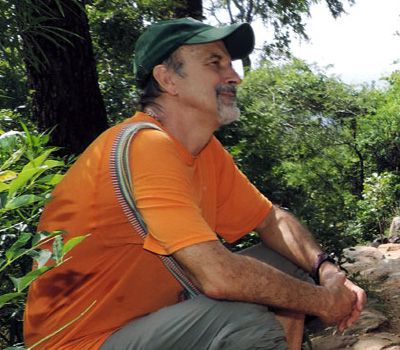Combining ecology with the powerful presence of religion in human nature
Christians, Hindus, Jews, Buddhists, Muslims, Confucians, and Atheists may have different beliefs but it is clear that no matter one's religious practice, each of us is affected by the current environmental crisis. Interestingly, each of the religious traditions share a common concern for the environment and oftentimes a duty for reverent care. Dr. David Haberman, of Indiana University, investigates the role that religion plays in the foreboding environmental crisis. His research identifies the contributions that religion makes to the causes as well as potential solutions to the environmental crisis by examining the manner in which religious worldviews shape human attitudes and behaviors toward the nonhuman world. Therefore, with a novel approach to environmental issues, Dr. Haberman hopes to use religion to foster a change of consciousness that effectively addresses the environmental crisis.
While his work includes an interest in the relationship between ecology and religion worldwide, the great majority of his textual and ethnographic work has taken place within the Hindu traditions of India. The combination between Dr. Haberman's interest in the intersection of religion and ecology more generally and his expertise in Hindu traditions has clearly defined him as one of the leaders within his discipline. His many books are evidence of the indepth analysis in addition to the seamless weaving between the environment and religious practice that lay the foundation for Dr. Haberman's work. In addition to his academic rigor, he also is on the advisory board of the Forum on Religion and Ecology based at the Yale School of Forestry and Environmental Studies, thus solidifying his role as a leader and advocate for environmental stewardship. While there are many ways to work towards a solution to the environmental crisis at hand, not many are outside of the realms of science and engineering. Therefore, Dr. Haberman's unique perspective not only shines light on ecology, but does so in an innovative way.
Current projects include:
-
Loving Stones: Dr. Haberman is currently working on a book entitled Loving Stones that is about the human conceptions and interactions with mountains and stones in Hindu India. Previous funding from a Fulbright fellowship and a Guggenheim have allowed him to begin this project and it will therefore be ready for market in the near future.
-
Eco-village Movement: Eco-villages are popping up all around the globe. These intentional communities that are based on a sustainable way of living shed light on the intersection between religion and ecology. Dr. Haberman hopes to begin conducting research on the religious worldviews emerging from the growing international eco-village movement.
Bio
Dr. Haberman is a professor of Religious Studies at Indiana University, Bloomington, specializing in the Hindu religious traditions of India. After receiving a B.A. in Religious Studies from the University of Colorado in 1976 and a Ph.D. in History of Religions from the University of Chicago in 1984, he taught at the University of Arizona and Williams College before joining the faculty at Indiana University in 1993.
Ever since he fell in love with the study of the world's religious traditions, Dr. Haberman realized that there is little that is essentially given in human experience. Dr. Haberman explains, "reality for humans is malleable and quite varied, almost everything gets filtered through and shaped by a particular cultural lens. Something as simple as a tree is not so simple after all." Through the publication of many books including, Acting as a Way of Salvation: A Study of Raganuga Bhakti Sadhana, Journey Through Twelve Forests: An Encounter with Krishna, River of Love in an Age of Pollution: The Yamuna River of Northern India, and People Trees: Worship of Trees in Northern India, Dr. Haberman has indepthly explored South Asian religious traditions. Most recently however, his focus has shifted to the intersection between Ecology and Religion.
In his free time, aside from research, Dr. Haberman is a lover of the outdoors. He enjoys backpacking, hiking, biking, kayaking, and nearly anything that gets him out in nature. As a Colorado native, Dr. Haberman considers himself a "Colorado nature boy" and therefore in addition to academic work, has always been involved in environmental movements.
Website: http://indiana.edu/~relstud/people/profiles/haberman_david
In the News
John Simon Guggenheim Memorial Foundation


